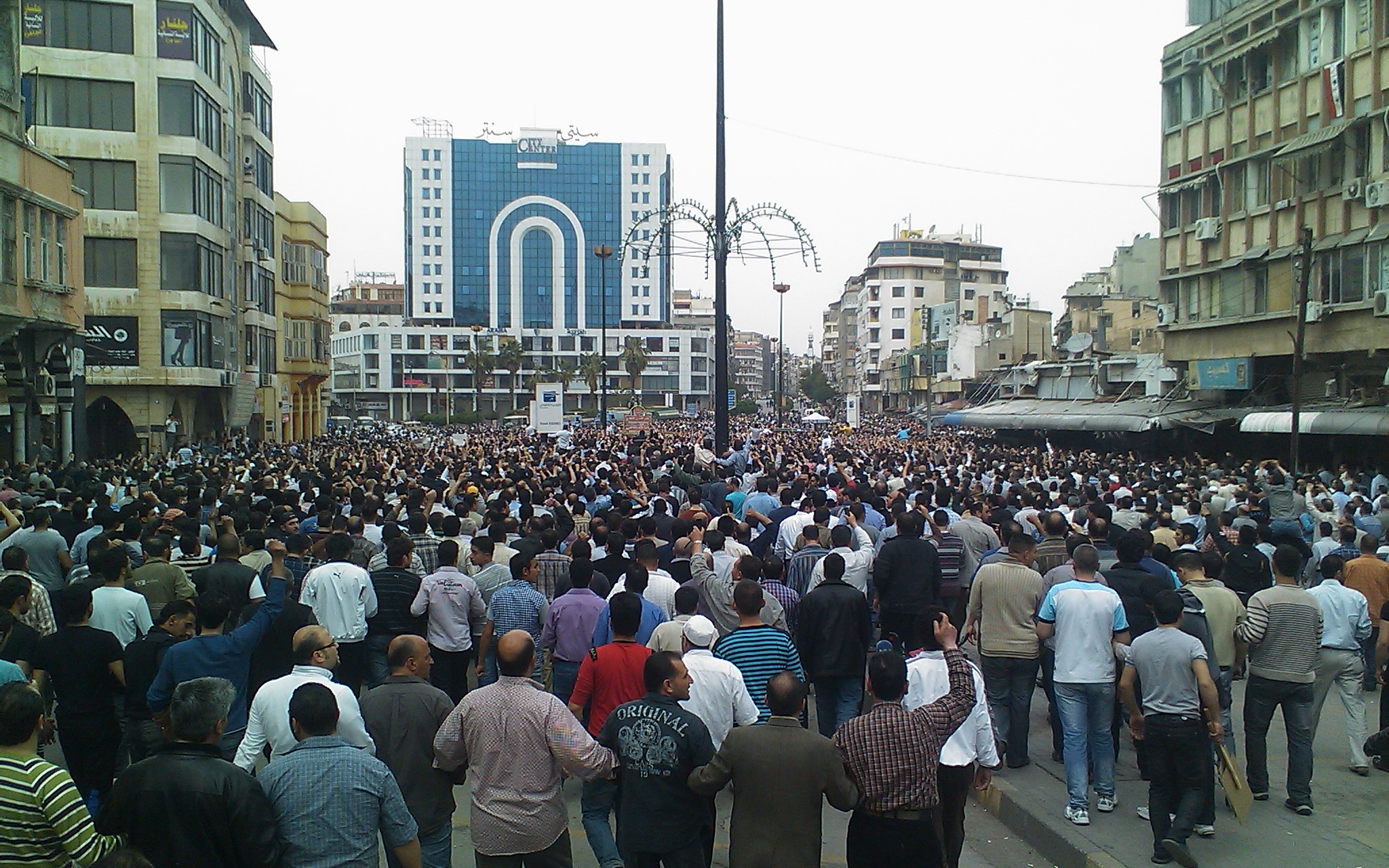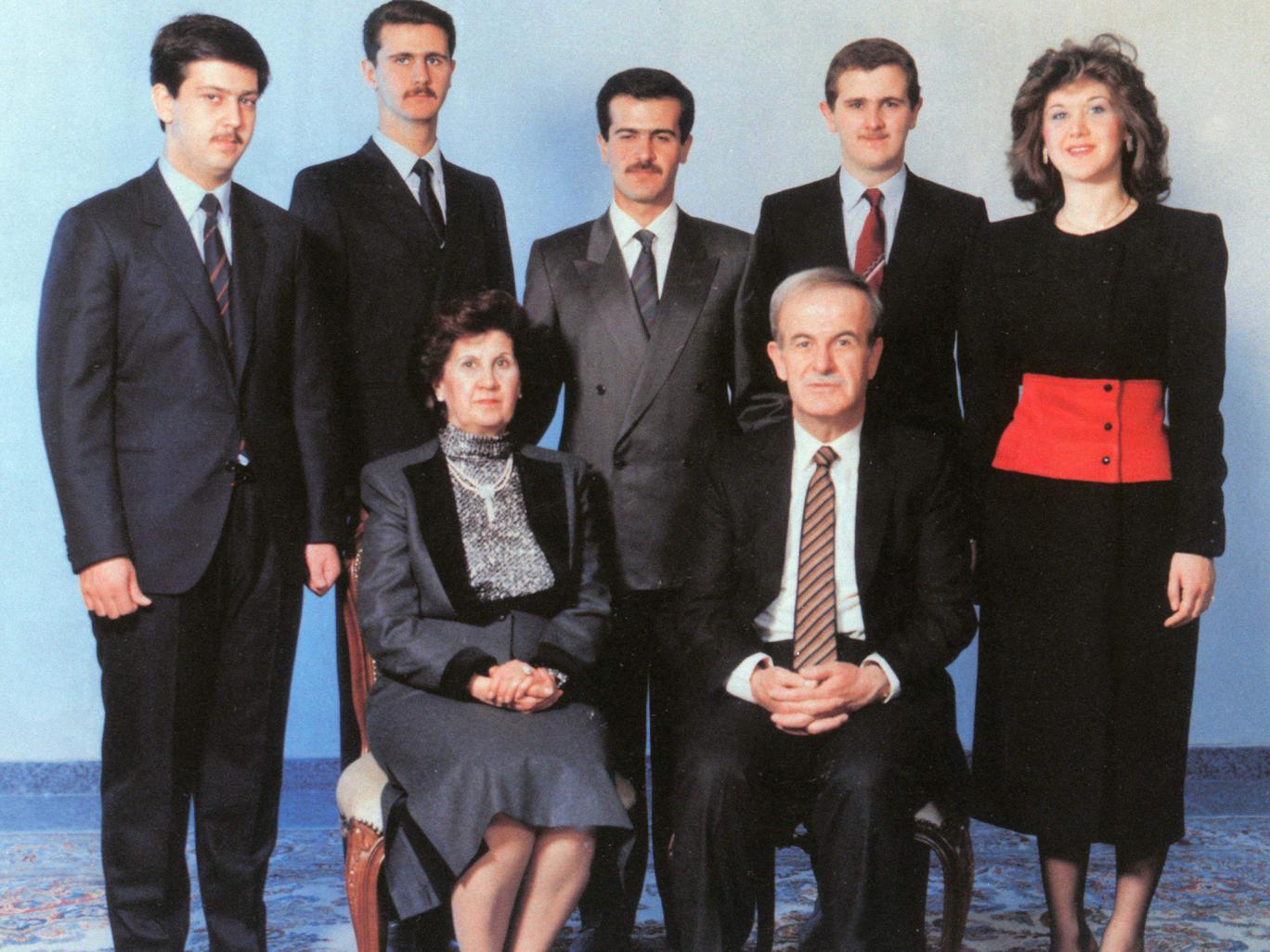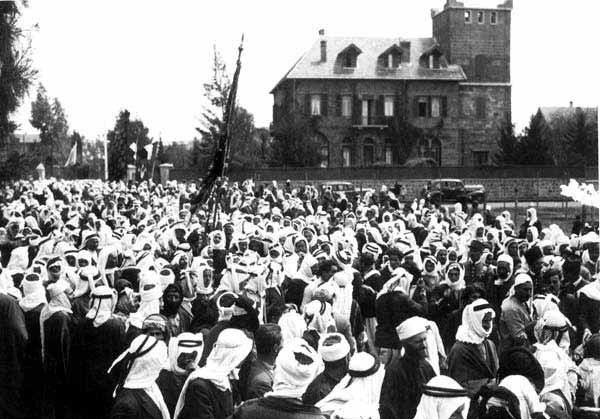|
Southern Syria Protests (2023–24)
On 17 August 2023, popular protests driven by escalating economic hardships erupted in the Druze majority city of As-Suwayda, initially drawing hundreds of participants. These protests, which quickly expanded in scope and intensity, saw thousands by 20 August chanting slogans demanding the downfall of the authoritarian Assad government, invoking memories of the Arab Spring. By 24 August, the protests had spread to the city of Daraa. Triggered by a government decision earlier in the month to slash fuel subsidies, which more than doubled the cost of gasoline, the protests symbolized a boiling point of over a decade of accumulated grievances. These included government violence, deteriorating living standards, and a political stalemate that has left the war unresolved. In response to widespread demonstrations, the Assad government, known for harshly suppressing dissent, faced a particularly delicate situation in As-Suwayda. Since 2011, this Druze-majority region avoided participati ... [...More Info...] [...Related Items...] OR: [Wikipedia] [Google] [Baidu] |
Syrian Revolution
The Syrian revolution, also known as the Syrian Revolution of Dignity, was a series of mass protests and civilian uprisings throughout Syria – with a subsequent violent reaction by the Ba'athist regime – lasting from 15 March 2011 to 8 December 2024 as part of the greater Arab Spring in the Arab world. The revolution, which demanded the end of the decades-long Assad family rule, began as minor demonstrations during January 2011 and transformed into large nation-wide protests in March. The uprising was marked by mass protests against the Ba'athist dictatorship of president Bashar al-Assad meeting police and military violence, massive arrests and a brutal crackdown, resulting in hundreds of thousands of deaths and tens of thousands wounded. 13 years after the start of the revolution, the Assad regime fell in 2024 after a series of rebel offensives. Despite al-Assad's attempts to crush the protests with crackdowns, censorship and concessions, the mass protests had become a ... [...More Info...] [...Related Items...] OR: [Wikipedia] [Google] [Baidu] |
Fall Of The Assad Regime
On 8 December 2024, the Assad regime collapsed during a 2024 Syrian opposition offensives, major offensive by Syrian opposition, opposition forces. The offensive was spearheaded by Hay'at Tahrir al-Sham (HTS) and supported mainly by the Turkish-backed Syrian National Army as part of the ongoing Syrian civil war that began with the Syrian revolution in 2011. The Fall of Damascus (2024), capture of Syria's capital, Damascus, marked the end of the Assad family's rule, which had governed Syria as a hereditary Totalitarianism, totalitarian dictatorship since Hafez al-Assad assumed power in 1971 after a Corrective Movement (Syria), successful coup d'état. As Southern Operations Room, a rebel coalition advanced towards Damascus, reports emerged that Bashar al-Assad had fled the capital aboard a plane to Russia, where he joined his family, already in exile, and was granted Right of asylum, asylum. Following his departure, opposition forces declared victory on state television. Concu ... [...More Info...] [...Related Items...] OR: [Wikipedia] [Google] [Baidu] |
2018 Southern Syria Offensive
Eighteen or 18 may refer to: * 18 (number) * One of the years 18 BC, AD 18, 1918, 2018 Film, television and entertainment * ''18'' (film), a 1993 Taiwanese experimental film based on the short story ''God's Dice'' * ''Eighteen'' (film), a 2005 Canadian dramatic feature film * 18 (British Board of Film Classification), a film rating in the United Kingdom, also used in Ireland by the Irish Film Classification Office * 18 (''Dragon Ball''), a character in the ''Dragon Ball'' franchise * "Eighteen", a 2006 episode of the animated television series ''12 oz. Mouse'' Science * Argon, a noble gas in the periodic table * 18 Melpomene, an asteroid in the asteroid belt Music Albums * ''18'' (Moby album), 2002 * ''18'' (Nana Kitade album), 2005 * '' 18...'', 2009 debut album by G.E.M. * ''18'' (Jeff Beck and Johnny Depp album), 2022 Songs * "18" (5 Seconds of Summer song), from their 2014 eponymous debut album * "18" (One Direction song), from their 2014 studio album ''Four ... [...More Info...] [...Related Items...] OR: [Wikipedia] [Google] [Baidu] |
Free Syrian Army
The Free Syrian Army (FSA; ) is a Big tent, big-tent coalition of decentralized Syrian opposition (2011–2024), Syrian opposition rebel groups in the Syrian civil war founded on 29 July 2011 by Colonel Riad al-Asaad and six officers who defected from the Syrian Armed Forces. The officers announced that the immediate priority of the Free Syrian Army was to safeguard the lives of protestors and civilians from the Syrian revolution#Crackdown, deadly crackdown by Bashar al-Assad's security apparatus; with the ultimate goal of accomplishing the objectives of the Syrian revolution, namely, the end to the decades-long reign of the ruling Assad dynasty, al-Assad family. (Pages 6, 14–17.) In late 2011, the FSA was the main Syrian military defectors group. Initially a formal military organization at its founding, its original command structure dissipated by 2016, and the FSA identity was later used by several different Syrian opposition to Bashar al-Assad, Syrian opposition groups. T ... [...More Info...] [...Related Items...] OR: [Wikipedia] [Google] [Baidu] |
Syrian Opposition
Syrians () are the majority inhabitants of Syria, indigenous to the Levant, most of whom have Arabic, especially its Levantine and Mesopotamian dialects, as a mother tongue. The cultural and linguistic heritage of the Syrian people is a blend of both indigenous elements and the foreign cultures that have come to rule the land and its people over the course of thousands of years. By the seventh century, most of the inhabitants of the Levant spoke Aramaic. In the centuries after the Muslim conquest of the Levant in 634, Arabic gradually became the dominant language, but a minority of Syrians (particularly the Assyrians and Syriac-Arameans retained Aramaic (Syriac), which is still spoken in its Eastern and Western dialects. The national name "Syrian" was originally an Indo-European corruption of Assyrian and applied to Assyria in northern Mesopotamia, however by antiquity it was used to denote the inhabitants of the Levant. Following the Muslim conquest of the Levant, Arab ... [...More Info...] [...Related Items...] OR: [Wikipedia] [Google] [Baidu] |
Daraa Governorate (January 15 2020)
Daraa Governorate ( / ALA-LC: ') is one of the fourteen governorates (provinces) of Syria. It is situated in the south-west of the country and covers an area of 2594 km2. It is bordered by Jordan to the south, Quneitra Governorate and Golan Heights to the west, Rif Dimashq Governorate to the north and As-Suwayda Governorate to the east. The governorate has a population of 922,000 (2010 estimate). The capital is the city of Daraa. Several clashes have occurred within the governorate throughout the Syrian civil war. History Syrian Civil War (2011–present) Protests and subsequent clashes between Syrian government and armed civilians (2011-2012) Civilians in Daraa began protesting against the government's authoritarian practices, which later prompted similar protests across the country. The Syrian government responded by besieging the city, which prompted some protesters to arm themselves. The escalating tensions eventually lead to the creation of the Free Syrian Army on ... [...More Info...] [...Related Items...] OR: [Wikipedia] [Google] [Baidu] |
Daraa
Daraa (, Levantine Arabic: ) is a city in southwestern Syria, north of the border with Jordan. It is the capital of Daraa Governorate in the Hauran region. Located south of Damascus on the Damascus–Amman highway, it serves as a way station for travelers. Nearby localities include Umm al-Mayazen and Nasib to the southeast, al-Naimah to the east, Ataman to the north, al-Yaduda to the northwest and Ramtha, Jordan, to the southwest. According to the Syrian Central Bureau of Statistics, Daraa had a population of 97,969 in the 2004 census. It is the administrative center of a ''nahiya'' (subdistrict) which contained eight localities with a collective population of 146,481 in 2004. By the 3rd century, it had gained the status of polis or self-governed city. The Roman historian Eusebius referred to it. The area east of Adraa was a centre of the Ebionites. Adraa itself was a Christian bishopric. Arabio, the first bishop of Adraa whose name is known, participated in the ... [...More Info...] [...Related Items...] OR: [Wikipedia] [Google] [Baidu] |
Arab Spring
The Arab Spring () was a series of Nonviolent resistance, anti-government protests, Rebellion, uprisings, and Insurgency, armed rebellions that spread across much of the Arab world in the early 2010s. It began Tunisian revolution, in Tunisia in response to corruption and economic stagnation. From Tunisia, the protests initially spread to five other countries: Libya, Egypt, Yemen, Syria and Bahrain. Rulers were deposed (Zine El Abidine Ben Ali of Tunisia, Muammar Gaddafi of Libya, and Hosni Mubarak of Egypt all in 2011, and Ali Abdullah Saleh of Yemen in 2012) and major uprisings and social violence occurred, including riots, civil wars, or insurgencies. Sustained street demonstrations took place in Morocco, Iraq, Algeria, Lebanon, Jordan, Kuwait, Oman and Sudan. Minor protests took place in Djibouti, Mauritania, Palestine, Saudi Arabia and the Western Sahara. A major slogan of the demonstrators in the Arab world is ''Ash-shab yurid isqat an-nizam, ash-shaʻb yurīd isqāṭ an- ... [...More Info...] [...Related Items...] OR: [Wikipedia] [Google] [Baidu] |
As-Suwayda
Suwayda (), also spelled Sweida, is a mainly Druze city located in southern Syria, close to the border with Jordan. It is the capital of Suwayda Governorate, one of Syria's 14 governorates, bordering Jordan in the South, Daraa Governorate in the West and Rif Dimashq Governorate in the north and east. The city is referred to by some as "Little Venezuela" due to the city's influx of affluent Venezuelan Syrian immigrants. Many of them originally emigrated from Suweida in the nineteenth century, so when their descendants returned, they brought back the Spanish language and South American culture. History Ancient and Medieval eras The city was founded by the Nabataeans as Suada. It became known as Dionysias Soada () in the Hellenistic period and the Roman Empire, for the god Dionysus, patron of wine - the city is situated in a famous ancient wine-producing region. The name ''Dionysias'' replaced the former Nabataean name in 149 AD after Nabataean influence decreased and the ... [...More Info...] [...Related Items...] OR: [Wikipedia] [Google] [Baidu] |
Druze In Syria
Druze is the third-largest religion in Syria with 2010 results recording that their adherents made up 3.2 percent of the population. The Druze are concentrated in the rural, mountainous areas east and south of Damascus in the area of Mount Druze. Druze is a monotheistic and Abrahamic religion. Syria has the largest Druze population in the world, Many Syrian Druze have been living abroad for centuries, particularly in Venezuela. History Druze is an Abrahamic monotheistic religion that is a gnostic offshoot and Neoplatonist sect of Isma'ilism, a branch of Shia Islam. The Druze evolved from Islam and now are an independent religion. The Druze follow a ''batini'' or esoteric interpretation of the Five Pillars of Islam. Since they do not fast during the month of Ramadan or make pilgrimages to Mecca, they are not regarded by Muslims as Islamic. The Druze follow a lifestyle of isolation where no conversion is allowed, neither out of nor into, the religion. When Druze live amo ... [...More Info...] [...Related Items...] OR: [Wikipedia] [Google] [Baidu] |
Arab Socialist Ba'ath Party – Syria Region
The Arab Socialist Ba'ath Party – Syria Region ( ''Ḥizb al-Ba'th al-'Arabī al-Ishtirākī – Quṭr Sūriyā''), officially the Syrian Regional Branch (), was a Neo-Ba'athism, neo-Ba'athist organisation founded on 7 April 1947 by Michel Aflaq, Salah al-Din al-Bitar and followers of Zaki al-Arsuzi. The party Ba'athist Syria, ruled Syria from the 1963 Syrian coup d'état, 1963 coup d'état, which brought the Ba'athists to power, until 8 December 2024, when Bashar al-Assad fled Damascus in the face of a rebel offensive during the Syrian Civil War. It was formally disbanded in January 2025. The party was founded on 7 April 1947 as the Ba'ath Party, Arab Ba'ath Party through the merger of the Arab Ba'ath Movement led by Michel Aflaq, Michel ʿAflaq and Salah al-Din al-Bitar and the Arab Ba'ath, led by Zaki al-Arsuzi. The party espoused Ba'athism, which is an ideology mixing Arab nationalism, Arab nationalist, Pan-Arabism, pan-Arab, Arab socialism, Arab socialist, and Anti-impe ... [...More Info...] [...Related Items...] OR: [Wikipedia] [Google] [Baidu] |
Syrian Opposition To Bashar Al-Assad
Syrians () are the majority inhabitants of Syria, indigenous to the Levant, most of whom have Arabic, especially its Levantine and Mesopotamian dialects, as a mother tongue. The cultural and linguistic heritage of the Syrian people is a blend of both indigenous elements and the foreign cultures that have come to rule the land and its people over the course of thousands of years. By the seventh century, most of the inhabitants of the Levant spoke Aramaic. In the centuries after the Muslim conquest of the Levant in 634, Arabic gradually became the dominant language, but a minority of Syrians (particularly the Assyrians and Syriac-Arameans retained Aramaic (Syriac), which is still spoken in its Eastern and Western dialects. The national name "Syrian" was originally an Indo-European corruption of Assyrian and applied to Assyria in northern Mesopotamia, however by antiquity it was used to denote the inhabitants of the Levant. Following the Muslim conquest of the Levant, Arab id ... [...More Info...] [...Related Items...] OR: [Wikipedia] [Google] [Baidu] |







